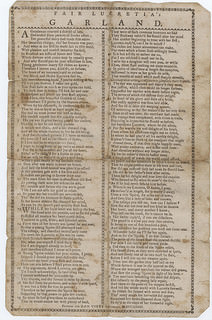 The Yale Collection of American Literature has acquired an apparently unrecorded 18th Century American verse broadside: “Fair Lucretia’s Garland,” [New Haven?]: Printed for Dan Viets, September, [1779] (Description: 1 sheet ([1] p.) ; 36 x 24 cm).
The Yale Collection of American Literature has acquired an apparently unrecorded 18th Century American verse broadside: “Fair Lucretia’s Garland,” [New Haven?]: Printed for Dan Viets, September, [1779] (Description: 1 sheet ([1] p.) ; 36 x 24 cm).
The poem recounts the tragic tale of a young merchant who falls in love with Lucretia, becomes engaged to her, then sails away to make his fortune. The text is surrounded by printer’s ornaments of four-petaled flowers, suns, and rosettes. The first two printers’ ornaments were used by Samuel and Thomas Green who were printing in partnership in New Haven, 1769-1797.
Dan Viets was born on 2 July 1751 at Newgate, Simsbury, Connecticut. He was the son of Captain John Viets and Lois Phelps. Captain Viets was the first keeper of Newgate prison which received its first prisoner December 22, 1773. Dan Viets’s brother was the Reverend Roget Viets, a Yale graduate, who during the Revolution was fined and imprisoned for supporting Loyalists.
A unique copy of a 1795 Danbury, Connecticut, 12-page pamphlet exists at the Huntington Library with the title Fair Lucretia: being a sorrowful history of a rich merchant, and the daughter of a farmer in England. Occasioned by a squire’s love for her, and her parents desire for riches. The American Antiquarian Society holds several versions of the poem, including a unique copy published in Hudson, New York in 1797.
The poem begins: “A Gentleman courted a damsel of late,/Descended from parents of slender estate;/Yet powerful fancy had made him adore/Her beautiful charms, tho’ her fortune was poor…” Upon his return he finds her parents have prevailed upon her to marry a rich squire. He engages in a sword fight “and slew the young ‘squire in sight of his love./ The merchant beholding the deed did despair,/ Did instantly to the young lady repair,/ And there on the point of his weapen (sic) he fell,/ And bid the whole world with Lucretia farewell./ So lifeless she fainted with terror and fear,/ Tho’ many maids for her relief did appear,/ Remained her senses departed from light,/ So dy’d in the days of her sorrowful night.”
The broadside can be located in Yale’s online Orbis database or through the Beinecke’s digital collections database: Fair Lucretia’s garland
